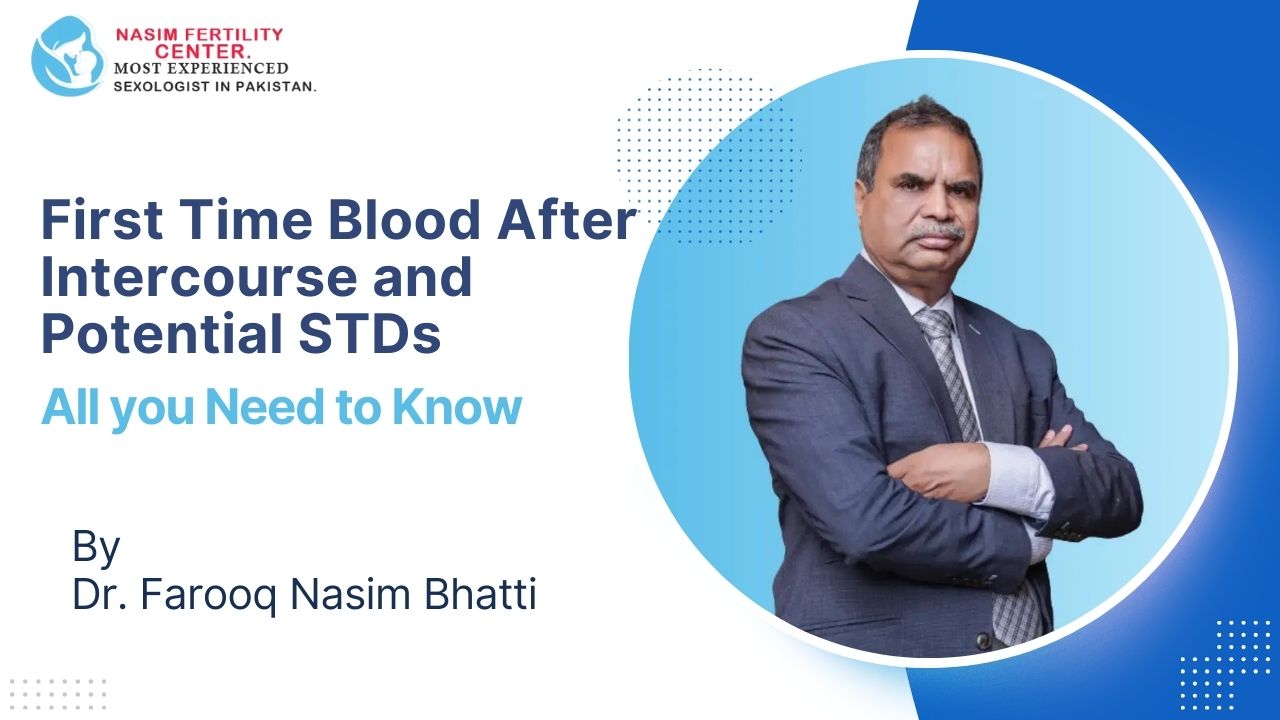
Sexual health can be a sensitive yet essential topic for many individuals, especially for those who are engaging in sexual activity for the first time. One of the common concerns is noticing blood during or after first-time intercourse.
While it can be a natural occurrence, understanding why it happens, potential risks, and the link with sexually transmitted diseases (STDs) is crucial.
This guide, written by Dr. Farooq Nasim Bhatti, MBBS, Diplomate of the American Board of Sexology (USA) since 1999, FAACS (USA), a sexologist with 31 years of experience, aims to provide detailed insights on this topic, addressing everything from hymen-related issues to potential STD risks and prevention.
Introduction
For many individuals, the first time having sexual intercourse can bring a mix of excitement, nervousness, and sometimes confusion, especially when unexpected symptoms like bleeding occur. While experiencing some bleeding after the first intercourse is not uncommon, it can cause concern if the reason is unclear. The primary reason is often related to the breaking of the hymen, but it’s essential to explore other possible factors that might contribute to this.
First-time bleeding can also bring to light the potential for STDs, which can affect both men and women, especially if proper precautions are not taken. Understanding the link between first intercourse, bleeding, and sexually transmitted diseases can help ensure that sexual health remains a priority. In this guide, we will explore various reasons for bleeding, risks of sex, and how STDs could play a role in overall reproductive health.
Dr. Farooq Nasim Bhatti, an expert sexologist based in Lahore, Islamabad, and Faisalabad, offers his expertise on the subject, ensuring a well-rounded perspective that addresses not only the physical but also the emotional concerns related to first-time intercourse and STDs.
What is Hymen?
The hymen is a thin membrane that partially covers the vaginal opening. It is often associated with virginity, but this connection is largely a cultural belief. Not every woman is born with a hymen, and its structure and size can vary greatly. For those who do have a hymen, it may stretch or tear during the first sexual intercourse, resulting in a small amount of bleeding. This is often referred to as “first-time bleeding” or “first sex blood.”
However, it is important to note that the hymen can also break for reasons unrelated to sex. Activities such as sports, tampon use, or even certain types of physical movement can cause the hymen to tear. Thus, the presence or absence of a hymen does not reliably indicate a person’s sexual history.
Pehli baar taluq ke baad bleeding ya STD ka shuba hai?
Confused ya ghabrayein nahi — Dr. Farooq Nasim Bhatti se confidential consultation lein aur apni health ka expert check-up karwayein.

Do Other Reasons May Break the Hymen?
Yes, there are several non-sexual reasons that can cause the hymen to break. Many individuals who experience first-time sex bleeding assume that it is due to the hymen breaking, but this membrane can tear earlier due to various factors. Here are some common reasons:
- Physical Activities: Engaging in sports like cycling, horseback riding, or gymnastics can put pressure on the vaginal area and lead to the hymen stretching or breaking.
- Tampon Usage: Using tampons can also cause the hymen to tear, as inserting and removing them puts pressure on the vaginal opening.
- Medical Procedures: Certain gynecological examinations or procedures may involve the use of instruments that can cause the hymen to break.
- Accidents or Injuries: Falls or direct trauma to the pelvic area can sometimes result in hymenal tears.
Thus, the breaking of the hymen is not exclusive to sexual activity, and bleeding from first-time intercourse could be due to other physical factors.
What are the Possible Risks of Having Sex?
Sexual intercourse, particularly for the first time, comes with a range of risks that individuals need to be aware of. These risks are not limited to bleeding but can extend to infections, injuries, or emotional stress. Here are some of the most common risks associated with sex:
- Physical Injuries: Especially during first-time intercourse, discomfort, pain, or injury to the vaginal or penile tissue can occur due to lack of lubrication or improper technique. This can cause minor bleeding or irritation.
- Unintended Pregnancy: Having unprotected sex increases the risk of unintended pregnancy. Even with contraception, no method is 100% foolproof.
- Sexually Transmitted Diseases (STDs): Engaging in unprotected sex with someone who has an STD can result in the transmission of infections such as chlamydia, gonorrhea, or HIV.
- Emotional Stress: The emotional impact of having sex, especially if it’s the first time, can sometimes lead to anxiety or feelings of regret, particularly if the experience was painful or unplanned.
It’s crucial to communicate openly with your partner and to be well-prepared for your first sexual experience. Taking precautions, such as using protection and ensuring emotional readiness, can minimize these risks.
Is There Any Link between STDs and Pregnancy?
There is no direct link between STDs and pregnancy, but they are both potential outcomes of unprotected sexual intercourse. However, it’s important to note that having an STD can complicate pregnancy and childbirth if left untreated. For instance, sexually transmitted infections (STIs) like chlamydia and gonorrhea can lead to complications such as pelvic inflammatory disease (PID), which can affect fertility and increase the risk of ectopic pregnancies.
Pregnant women who contract an STD can also pass the infection on to their child during pregnancy or childbirth, leading to serious health risks for the baby, such as neonatal infections or birth defects.
What is the Treatment for STDs?
The treatment for sexually transmitted diseases depends on the type of infection. Most bacterial STDs, such as chlamydia, gonorrhea, and syphilis, can be treated with antibiotics prescribed by a healthcare professional. These treatments are usually straightforward, but early detection is critical to prevent long-term complications.
For viral STDs such as herpes or HIV, treatment focuses on managing symptoms, as there is no cure. Antiviral medications can help control outbreaks and lower the risk of transmission to others.
It’s essential to get tested regularly if you are sexually active and to consult a healthcare provider like Dr. Farooq Nasim Bhatti if you suspect an infection.
What are the STD Prevention Tips?
Preventing STDs is possible by taking the following steps:
- Use Protection: Always use condoms or dental dams during sexual activity to reduce the risk of STD transmission.
- Get Vaccinated: Vaccines are available for certain STDs, such as HPV and hepatitis B. Make sure to get vaccinated if recommended.
- Limit Partners: Reducing the number of sexual partners can minimize exposure to STDs.
- Regular Testing: Regular STD testing helps detect infections early and prevents the spread to others.
- Communication: Have open discussions with your partner(s) about sexual history and STD testing to ensure mutual safety.
Expertise of Dr. Farooq Nasim Bhatti
Dr. Farooq Nasim Bhatti, MBBS, FAACS (USA), Diplomate of the American board of Sexology (USA) since 1999, CST, HSC (Hong Kong), CART (MALAYSIA), CART (CHINA), is a renowned sexologist with 31 years of experience, specializing in sexual health and the treatment of sexual dysfunction. He offers consultations at his clinics in Lahore, Islamabad, and Faisalabad, as well as online consultations for patients across Pakistan. His vast experience in dealing with issues like erectile dysfunction, premature ejaculation, and sexually transmitted infections makes him an authority on sexual health in Pakistan.
Dr. Farooq Nasim Bhatti’s compassionate approach and proven treatments ensure that his patients receive the best care and advice. If you’re facing concerns related to your sexual health, do not hesitate to reach out to him for an expert consultation.
Conclusion
First-time bleeding after intercourse can be alarming, but understanding the reasons behind it and the risks associated with sexual activity can help ease concerns. While the hymen is often the culprit, it’s essential to consider other factors such as physical injuries or infections. The link between STDs and reproductive health underscores the importance of practicing safe sex, getting tested regularly, and seeking medical advice when necessary.
Dr. Farooq Nasim Bhatti is here to help you navigate your sexual health journey with expert advice and personalized care. Whether you are concerned about first-time sex bleeding or potential STDs, getting professional guidance is the best way to ensure your health and peace of mind.
FAQs
Is bleeding after first-time sex normal?
Yes, bleeding after first-time sex can be normal and is often due to the breaking of the hymen. However, if the bleeding is heavy or prolonged, it’s best to consult a doctor.
Can the hymen break without having sex?
Yes, the hymen can break due to physical activities like sports, tampon usage, or medical procedures.
Can I get pregnant from first-time sex?
Yes, if you have unprotected sex during ovulation, there is a chance of pregnancy even from the first-time intercourse.
What should I do if I suspect an STD after first-time sex?
If you suspect you may have contracted an STD, it’s crucial to get tested immediately and seek medical treatment.
How can I prevent STDs during sexual activity?
You can prevent STDs by using protection like condoms, limiting sexual partners, getting vaccinated, and getting tested regularly.
Disclaimer
This information is for educational purposes and not the treatment. For treatment, you need to consult the doctor.

Dr. Farooq Nasim Bhatti (MBBS, FAACS – USA, Diplomate: American Board of Sexology, CST, HSC – Hong Kong, CART – Malaysia & China) is a qualified medical sexologist with 30+ years of experience. He has presented 21+ research papers internationally and treats sexual dysfunction through sex therapy, counseling, and pharmacotherapy to restore natural sexual function without temporary medication.

Regain Confidence with Our ED Solutions
Explore effective treatments for erectile dysfunction. Take charge of your intimacy today.


